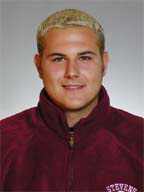No Ducking Stevens in NCAA Division III tourney
Stevens Tech’s baseball team makes first appearance in postseason parade
When the 2002 collegiate baseball season began, Stevens Tech head coach John Crane had one modest goal.
"Our goal was to win as many games as we can," said the 27-year-old Crane, who was starting his second season as the head coach of the Ducks. "We wanted to win as many games to have the possibility of winning our league [the Knickerbocker Conference] championship."
Sounds easy enough, right? Win as many games as the Ducks could. Sounds almost too modest. It’s like simply calling Salma Hayek just a pretty girl or saying that the Mona Lisa is a nice painting.
Well, things didn’t exactly start off so smoothly for the Ducks. They lost eight of their first nine games. Even with a veteran lineup returning, being 1-8 was not an enviable position to be in early in the season.
However, the determined and undermanned Ducks totally turned things around. They won 21 of their last 32 games to finish with the school’s best baseball record ever. They captured the Knickerbocker Conference title by defeating the College of Old Westbury and the College of Staten Island.
But more importantly, the Ducks earned a berth in the NCAA Division III tournament for the first time in the school’s history. They headed north to Colonie, N.Y., outside of Albany, to play Cortland State in the first round of the North Atlantic Regional this weekend.
"It’s a great achievement," Crane said from his hotel room in Albany, a day before the biggest game in the school’s history. "It’s a goal every year to get this far. To shoot for anything less than this would be accepting failure. But we’ve reached this point a little quicker than I could have imagined. I thought it might take four or five years. It took only two. That’s a credit to the players. They’re the ones who made it happen."
The Ducks enter the NCAA tourney with one of the smallest rosters in the field. Many of Crane’s players have more than one role with the team. Some play as many as four positions.
"We only have two guys who are strictly pitchers," Crane said. "We don’t carry a ton of guys like other teams."
For example, senior David Riley is the team’s starting shortstop, part-time center fielder and the Ducks’ closer out of the bullpen. Riley is hitting a team best .457 and has a 4-1 pitching record with an 0.66 earned run average.
Freshman Kevin Suders started the season as the Ducks’ catcher, but he’s been moved to the outfield and he also pitches, evident by his 3-1 pitching record and 3.55 ERA. Suders was the Most Valuable Player of the Knickerbocker Conference playoffs.
Another of the Ducks’ more versatile performers is junior pitcher/first baseman James Bailey of Jersey City. The former Hudson Catholic standout will get the ball to pitch the NCAA opener against Cortland State.
"James throws a heavy ball, keeps it down well," Crane said. "His record doesn’t indicate how well he’s pitched. He won’t be intimidated and challenges hitters. Our bullpen has been the strength of our team."
Junior Marlin Genao of Paterson has been a find. He broke the school record for RBI with 44. Senior catcher Phil Wolf tied the school record with five homers and has added 35 RBI. Senior third baseman Tom Sobe has delivered "one clutch hit after another," according to Crane, and is batting .403.
"It’s been a great accomplishment to get this far," Crane said. "I think the novelty of getting here for the first time is wearing off. We’re not here to be happy being here, to lose two games and come home. We want to play as well as we can, because we know anything can happen."
Sure, anything can happen, even when the first round opponent has qualified for the NCAA Tournament 12 straight years and has made six appearances in the Division III World Series.
"We have a pretty laid back group of guys," Crane said. "They don’t seem to get caught up in anything. Sure, the NCAA Tournament is something that none of them have ever experienced before. But they’re not into that. They’re just going to go out there and play with intensity."
Maybe their approach centers upon their commitment to academics as well. Each Stevens Tech student has to carry 168 credits to graduate, as well as the completion of a co-operative work program assignment.
"It’s a big sacrifice for all of them," Crane said. "It’s a big sacrifice to play baseball and concentrate on schoolwork at the same time. But that sacrifice is paying off in the long run."
With a chance to play with the big boys. And that’s nothing to quack at.
